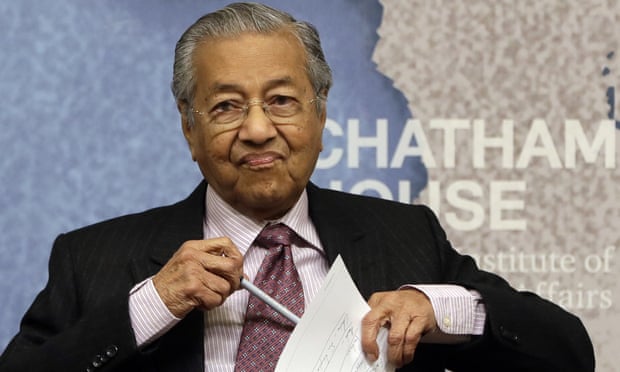From FT Alphaville:
For the 13th time in 30 years, Pakistan needs the IMF. This time around, the government is planning to ask for up to $7bn—it's largest request from the Fund to date—in order to sidestep a full-blown balance of payments crisis.Speaking of Malaysia, my second favorite Mandarin translator thinks there may be some China—Malaysia—Australia supply chain hijinks going on as Beijing tries to woo Dr. Mahathir back into the fold without having to give up anything on Malaysia's South China Sea claims.
For Pakistan, an IMF deal is a vital lifeline. For China, it represents another blunder for its $1trn-plus Belt and Road Initiative (known increasingly as BRI) at a time when many partnering countries are second guessing their involvement and even abandoning some projects.
With sizable twin deficits and a paltry $8.4bn stash of foreign currency reserves (not enough for even two months' worth of imports), Pakistan badly needs outside funding. The central bank's efforts to weaken its overvalued currency through multiple devaluations over the past year (five and counting) as well as hiking interest rates have done little to bring down the country's financing needs. Exotix's Hasnain Malik now puts the figure the government will need to borrow over the next three years at $15bn.
While taxes and its small, low-value export base explain much of Pakistan's fiscal and external imbalances, China also shoulders some of the blame—despite recent claims otherwise—for worsening the country's current account deficit, which the IMF believes will widen to 5.9 per cent of GDP by year-end. With 85 projects worth as much as $90bn in either the planning stages, under construction or completed, Pakistan has become a focal point of China's landmark BRI. The China-Pakistan Economic Corridor (CPEC) involves not only the building of roads, railways and ports, but also power plants and nuclear facilities, among others.
To break ground on any of these initiatives, Pakistan has had to import lots of raw materials from abroad, many of which come directly from China, and borrow directly from Chinese backers. So in exchange for modernised infrastructure, and the promise of economic growth that comes with it, Pakistan has had to stomach a worsening trade balance —the difference between a countries exports and imports—and higher debts.
Pakistan is not unique in seeing its fiscal position deteriorate because of its BRI connections, nor is it alone in voicing concerns about the inevitable liabilities that come with such lengthy, expensive construction projects that hinge repayment on benefits likely to be reaped long after debts come due. Several countries along the belt and road have come under similar strain, prompting some to rethink their financial relationship with China altogether as well.
In August, Malaysia's prime minister axed several multi-billion dollar projects, including the East-Coast Rail Link and two gas pipelines, citing concerns about runaway costs and affordability. Myanmar officials announced in June that they are reviewing and trying to revise down costs for a $9bn China-backed port. And Indonesia, Bangladesh and Thailand have turned away Chinese financing for new ports, rails and plants. According to Fitch Solutions, this year alone, nearly 38 projects have been cancelled or suspended, up from just 12 in 2016....MUCH MORE
The Prime Minister is probably most famous in the West for his feud with George Soros in 1997 when Mahathir called currency speculators “unscrupulous profiteers” engaged in an “unnecessary, unproductive and immoral” activity. That was his first go-roumd as PM. He's 93 now and China may just end up waiting for his replacement.
Mahathir's latest headline-making comments were when he referred to Jews as "hook-nosed" (Guardian) to which the (parody?) Mossad site responded that the good doctor could maybe use a bit of rhinoplasty himself:

Be all that as it may be, the writer of the Alphaville post, Colby Smith, may be one to keep an eye on.